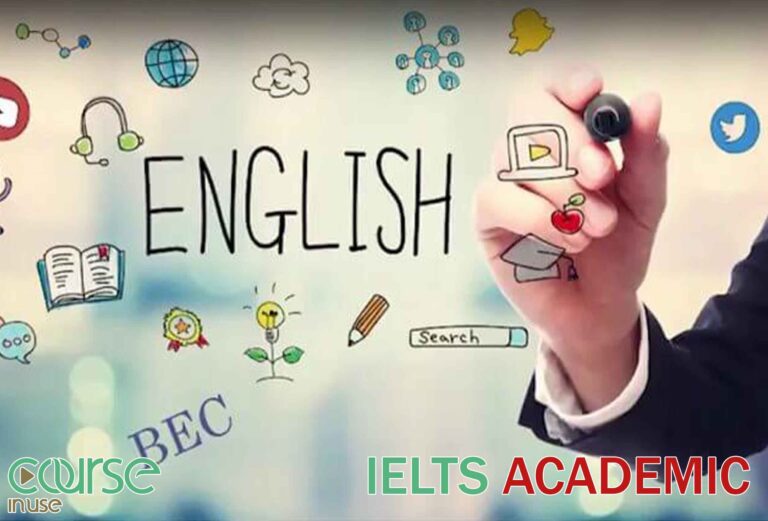The International English Language Testing System (IELTS) test is the first and most important step for applicants for work, life, and undergraduate studies in English-speaking countries such as Australia, Canada, New Zealand, or the United Kingdom. Having the necessary preparation for this exam is the reason for getting a high score, and getting a high score in the IELTS General exam allows you to work and study in English-speaking environments and guarantee your professional and academic future. In this article, we will answer all your questions regarding the IELTS General test, so stay with us
IELTS general syllabus
The General IELTS test, like the IELTS Academic , is designed to evaluate the applicants’ four English language skills, including Listening, Reading, Writing, and Speaking.
The purpose of each section in the IELTS General test is to measure and evaluate the candidates’ skills in communicating effectively in everyday situations. In the following, we have examined the format of the IELTS General exam
| Section | Format | Duration | Details |
| Listening | Four recordings followed by a series of questions. | 30 min + 10 min to transfer answers | Includes a range of English accents (British, American, Australian, New Zealand). |
| Reading | Three sections to answer 40 questions. | 60 min | Evaluation of reading comprehension skills, ability to reason logically, recognition of the overall meaning of the text |
| Writing | Two tasks: Task 1: Write a letter requesting information or explaining a situation (at least 150 words). Task 2: Write an essay in response to a point of view, argument, or problem (at least 250 words). |
60 min | Tests writing skills in formal and semi-formal contexts. |
| Speaking | Face-to-face interview with three parts | 11-14 min | Evaluates fluency, coherence, vocabulary, pronunciation, and grammatical accuracy. |
It should be noted that the face-to-face interview section consists of three parts
The first part includes an introduction and talks about general topics
Part 2 consists of the candidate’s speaking and commenting on a specific topic
Part 3 consists of a two-way discussion between the volunteer and the mediator regarding the particular issue in Part 2
IELTS general study material

IELTS General Listening
To strengthen listening, the best thing to do is dedicate a certain time in the day to listening to English conversations. We have compiled a list of the best podcasts in this field in the table below.
| podcast | level | Description |
| English class 101 | Beginner to Advanced | It includes various courses that language learners can choose based on their level |
| Breaking News English | Intermediate to Advanced | This podcast includes world news, which is a great podcast to improve your listening skills. Also, the speed of this podcast can be adjusted from slow to medium, which you can adjust according to your level. |
| Culips | Medium | This podcast contains four types of episodes and people speak fluently and slowly in it. This podcast is suitable for improving IELTS listening. |
| Splendid Speaking IELTS | Advanced | This podcast interviews people whose English language is not their mother tongue and is therefore very suitable for strengthening your listening skills in relation to different accents. |
| IELTS Speaking for Success | Intermediate to Advanced | In this podcast, two people talk to each other about different topics, which will strengthen your speaking skills in addition to your listening skills. |
IELTS General Reading
| Book | Level | Description |
| Get Ready for IELTS Reading | Beginner to Intermediate | The approach of this book is thematic and it strengthens this skill by using keywords related to IELTS topics in the reading section. |
| Collins Reading for IELTS | Intermediate to Advanced | This book consists of 12 different lessons with questions and answering techniques that help applicants to improve their reading skills. |
| The Official Cambridge Guide to IELTS | Intermediate to Advanced | This book is published by Cambridge Publishing and is suitable for improving reading skills for both IELTS General and Academic exams. |
| Improve Your Skills: Reading for IELTS | Intermediate to Advanced | This book is specifically designed to improve reading skills and is presented in three levels, including texts, techniques, exercises, and sample IELTS test questions. |
| IELTS Reading Recent Actual Tests | Intermediate to Advanced | This book contains different types of reading paragraphs that are simulated from IELTS reading |
IELTS General Speaking
| program | Description |
| IELTS Speaking | This application focuses exclusively on IELTS speaking skills and includes conversational exercises with the examiner as well as group discussions that strengthen speaking skills in the form of examples. |
| English Speaking App – Stimuler | This application is a free program that is made of more than 1000 different topics for conversation practice and includes pronunciation, fluency in speaking, vocabulary and grammar, as well as simulated real tests, and in this way, it helps applicants to improve their conversation skills. strengthen in themselves |
| American English Speaking | This software is designed with a focus on fluent conversation with an American accent and includes a variety of courses that can strengthen the conversation skills of applicants. |
How are IELTS scores calculated?
The IELTS General Training test evaluates the applicants’ four skills: listening, reading, writing, and speaking. The basis of grading is 9 marks in each section, and the total test score is the average of the 4 marks of this section.
| Section | Details |
| Listening | 40 questions, each worth 1 mark. – Correct answers are converted to the 9-band scale. – Approximate scores: 16 correct = Band 5, 23 correct = Band 6, 30 correct = Band 7, 35 correct = Band 8. |
| Reading | – 40 questions, each worth 1 mark. – General Training Reading requires more correct answers to achieve the same band as the Academic test. – Approximate scores: 15 correct = Band 4, 23 correct = Band 5, 30 correct = Band 6, 35 correct = Band 7. |
| Writing | – Two tasks: Task 1: Write a letter (150+ words). Task 2: Write an essay (250+ words). – Task 2 has more weight in scoring. – Assessed based on: 1. Task achievement/response 2. Coherence and cohesion 3. Lexical resource 4. Grammatical range and accuracy |
| Speaking | – Face-to-face interview. – Evaluated on: 1. Fluency and coherence 2. Lexical resource 3. Grammatical range and accuracy 4. Pronunciation |
| Overall Band Score | – The average of the four section scores, rounded to the nearest half band. |
When will I get my IELTS results?
Depending on whether you have taken the IELTS test online or in person, the time to get your results is different.
IELTS Online: 6 – 8 days
IELTS on computer:1 to 5 days
IELTS on paper: 13 days after the date of the test
IELTS for UKVI (on computer): 1-2 days
How many years is your IELTS test score valid for?
IELTS test scores (IELTS General and IELTS Academic) are valid for two years from the date of the test, and applicants can apply for admission to universities, institutions, and immigration authorities during this period.
IELTS General Key Preparation Strategies
You can achieve a high score in the IELTS General exam by following the strategies and practical tips that we have provided for you.
- Getting to know the format of the IELTS General exam: getting to know the different sections, in addition to helping you to appear in the meeting with more confidence, will also help you understand the exam in general.
- Time management: due to the fact that a specific time is allocated for each part of the exam, practicing time management skills can help you on the day of the exam so that you can answer the questions correctly in the same period of time.
- Use of reliable sources Today, there are very wide sources for preparing for the IELTS General exam, but it is not necessary for candidates to use all the sources, you should use a good source with a lot of repetition until you master it.
- Getting feedback: Try to practice with a good teacher in this field and ask him to have a conversation with you in the role of an examinee so that you can find your strengths and weaknesses.
- Listening to English podcasts: Try to listen to English podcasts on various platforms. Using English podcasts on a daily basis will help you improve your listening skills.
- Mock Tests: Using mock tests every week will help you improve your time management skills, and you can also identify your strengths and weaknesses with the help of mock tests and act to strengthen them.
Conclusion
as an applicant, if you want to get a high score in the IELTS General Training test, you should consider that the first step in getting a high score in the IELTS General test is practice along with a proper understanding of the test format and the use of quality resources and training courses We in the training team of Course in use are by your side by providing the highest quality online training courses along with more than hundreds of simulating questions of the IELTS General test until you reach your desired score, so register now for the training courses of the IELTS General test. Take the first step on your path to success




